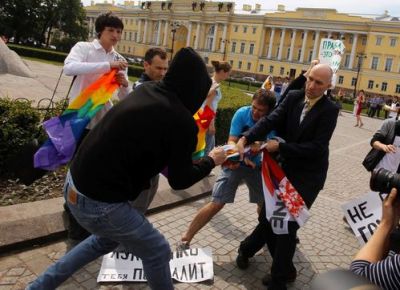
“Gay Propaganda” Law Passes in St. Petersburg, Is Completely Terrible
Back in November, the St. Petersburg legislature proposed a “gay propaganda” bill that would “protect minors” by censoring discussion — I mean “propaganda” — of homosexuality. The UK Foreign Office, the Europe and Central Asia Director of the Human Rights Watch, and the US State Department all denounced the bill, calling it everything from “wrong” to “a blatant attack on freedom of expression and a thinly disguised attempt to silence Russia’s LGBT community.”
The law went into effect this week in St. Petersburg, making it punishable by up to $16,700 to read, write, or speak about gay people in a way that the state doesn’t approve of.
It’s unclear what the ultimate effects of a law like this will be — it’s too early to tell how it will be enforced. In theory, it’s meant to protect children, and should affect only those forms of “propaganda” which might “promote sodomy, lesbianism, bisexuality and transsexuality” to them. Gay rights activists in Russia fear that it could extend to the censoring of literally any mention of queer or cis identities. Polina Savchenko, general manager of a St. Petersburg LGBT group, says that “No legal experts seem able to explain how this law would be applied in practice… The language of the law is so vague that it could apply to any kind of public discourse, any discussion of gay issues, in almost any venue.”
One effect it seems it will almost certainly have is the outlawing of public displays of protest, or events like pride parades.
It effectively outlaws all public events in support of gay rights, which are prohibited anywhere children might be present. St. Petersburg has previously allowed gay pride marches, unlike Moscow, which was sanctioned by the European Court of Human Rights for repeatedly withholding permission for the events.
Russia doesn’t have a strong history as far as rights for queers even before this law was passed; in fact, there isn’t a lot of freedom of expression in general. When interviewed last year, Manny de Guerre, the founder of Russia’s only LGBT film festival said:
Russian society is still incredibly homophobic. These recent statistics clearly show that. Things are changing towards LGBT and people are gradually being won over but there is an incredible amount of work to do. The State is constantly hindering our work, though –by closing down venues where we have festivals, or by introducing laws like this. It slows down the process incredibly and it will be many years and much work before people are tolerant toward the LGBT community in Russia.
At the time of that interview, there were “gay propaganda” laws in two other cities, and the fact that it’s now also passed in St. Petersburg (after activists managed to have the vote to pass it called off initially) is disheartening. Worse, the Russian Orthodox Church, which holds considerable sway, spoke out today calling for a national version of the law. While the church doesn’t dictate the state’s actions, there’s reason to believe that many would support the proposed legislation. In the meantime, activist Nikolay Alekseyev of GayRussia.ru has filed a lawsuit against the politician understood to be primarily behind the creation of the bill in St. Petersburg, “claiming the politician has inflicted damage to his honor and dignity.”
Activists and queer people in general face a lot of challenges in Russia, and the legislation passed in St. Petersburg is only the most recent example. But in December, de Guerre said:
Even though these statistics are very negative, people’s attitudes are beginning to change. Since October 2008 when Side by Side attempted our first festival, 10,300 people have attended our events and we have distributed over 18,000 information brochures on a range of topics including coming out, homophobia, transgender identities, LGBT parenthood, and religion. 25% of our audience is non-LGBT.
The law passed in St. Petersburg is a change for the worse. But change for the better is still possible.